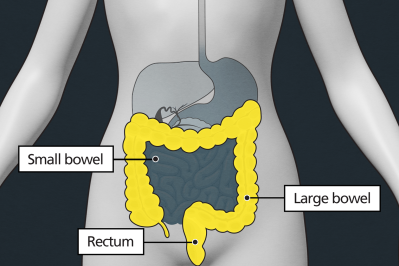
Bowel cancer screening can pick up bowel cancer early when it may be easier to treat. If you are invited to take a bowel cancer screening test – also known as a faecal immunochemical test (FIT test) – we would really recommend doing it.
About bowel cancer
Bowel cancer develops after a change in the DNA of the cells in the bowel. (DNA is the genetic material that tells cells what to do.) As these faulty cells divide and multiply, they eventually cause a cancer.
Sometimes a cancer cell from the tumour in your bowel can spread to other parts of your body such as your liver or lungs. This is known as a secondary (or ‘metastatic’) bowel cancer. It is also sometimes called advanced cancer.
You can reduce your risk of developing bowel cancer by eating a balanced diet with plenty of fibre, exercising regularly, staying a healthy weight and not smoking.
You may be more at risk of developing bowel cancer if you have an inflammatory bowel disease such as Crohn’s disease or ulcerative colitis.
Some people are more at risk of developing bowel cancer due to an inherited condition called Lynch syndrome. Everyone diagnosed with bowel cancer in Cheshire and Merseyside is now offered a genetic test for Lynch syndrome.
Symptoms
Symptoms of bowel cancer can include:
- Changes in your poo, such as having softer poo, diarrhoea or constipation that is not usual for you
- Needing to poo more or less often than usual for you
- Blood in your poo, which may look red or black
- Bleeding from your bottom
- Often feeling like you need to poo, even if you've just been to the toilet
- Tummy pain
- Bloating
- Losing weight without trying
- Feeling very tired for no reason
It is important to see a health professional if you have symptoms or changes in your bowel habits that are persistent – i.e. they last more than a couple of weeks.
Treatment at The Clatterbridge Cancer Centre
Treatment depends on a range of factors including the size, stage and location of your tumour. It may also depend on your age, general health and genetic factors (linked to the DNA changes in your cells) that tell us how your cancer developed.
Treatment options can include one or more of the following:
- Surgery – this may be before, during or after other treatments
- Drug therapies such as chemotherapy and immunotherapy. The general term for these is systemic anti-cancer therapies (SACT)
- Radiotherapy
When you are diagnosed, your care will be discussed at a multidisciplinary team meeting (MDT) where different specialists will consider the best treatment options for you. Your doctor will discuss this with you so you can decide what is right for you.
Genomics is the study of a person’s genes (or ‘genome’) – the material in DNA that makes each person unique. Cancer is caused by changes in the DNA of a cell and tell it to multiply out of control.
Understanding where this change has occurred – for example, which gene is faulty – can help us know which treatment will give you the best chance of killing the cancer cells and stopping new ones from growing.
Your clinical team will explain this to you in more detail at your appointment.
At The Clatterbridge Cancer Centre, we provide specialist non-surgical treatment for bowel cancer, colorectal and anal cancers. We also work closely with surgical teams in other hospitals to plan and coordinate your care every step of the way.
Systemic anti-cancer therapy (SACT)
SACT is a term used to describe the different drug therapies for cancer. These include:
- Chemotherapy – which aims to kill cancer cells
- Immunotherapy – which aims to train your immune system to attack cancer
- Targeted therapies – which aim to target the DNA and cell changes that cause cancer. For example, BRAF targeted therapy which blocks a protein linked to cancer cells
- Total neoadjuvant therapy – where you receive chemotherapy and radiotherapy before surgery
Radiotherapy
Radiotherapy may be used if your tumour is in your anus or your rectum (the bit just before your anus). We use different types of radiotherapy, depending on the size, location and stage of the cancer.
The radiotherapy treatments we offer for bowel cancer include:
- Traditional external beam radiotherapy – where radiation is delivered from outside the body
- Stereotactic ablative radiotherapy (SABR) – a way of very precisely targeting radiotherapy to certain cancers
- Papillon radiotherapy – a type of ‘contact radiotherapy’ where the radiation is placed inside the body in close contact with the tumour
Research and trials of new cancer treatments are an important part of our work. Your consultant will tell you about any clinical trials that may be suitable for you.
You are also very welcome to ask us about clinical trials during your appointments. We will be happy to answer any questions you have.
Find out more about clinical trials.
Our team
The team consists of clinical oncologists, medical oncologists, a nurse consultant, clinical nurse specialists, radiographers, pharmacy, research practitioners, administrative support and a cancer support worker.
Our operational management team makes sure the service runs smoothly.
Medical Oncologists
Dr Zahed Khan
Dr Julie O’Hagan
Dr Roopa Kurup
Dr Noor-ul-ain Tariq
Clinical Oncologists
Dr Amir Montazeri
Dr Victoria Shallcross
Dr Mary Anthony-Pillai
Dr Teresa Dinizulu
Nurse Consultant
Jeanette Ribton
Advanced Nurse Practitioner
Janine Ross
Clinical Nurse Specialists
Kim Lewis
Sian Davis
Hannah Jones
Ashleigh Gray
Rachel Copp
Further information
Our Cancer Information and Support Centres can provide individualised help and support for patients and families affected by cancer. The team’s main base is in Clatterbridge Cancer Centre – Liverpool but they also work at our Aintree and Wirral hospitals.
There are also local Macmillan services in other hospitals across our region.
External sites that offer extra support and information about different types of bowel cancer include: